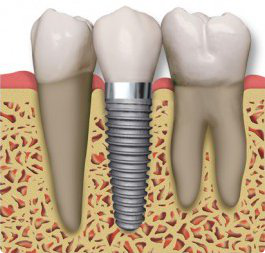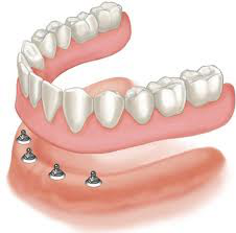Restorative Dentistry in Park City, UT
Restorative dentistry serves to restore teeth that may have been damaged through common oral health problems or more serious dental issues. Tooth decay, wear, and damage are a natural result from the intense workout and bacterial influx our mouths get every day. Our team can restore your damaged teeth with natural-looking materials, like composite resin fillings and porcelain crowns. Often time’s restorative dental procedures are a result of a patient who either has overlooked the necessity of routine dental care or has a dental problem that was not visible by the naked eye. This is why we recommend visiting our dental office every six months to check for signs of tooth decay, gum disease or other dental health issues that may be prevented before they become costly or more serious. Below is a list of the common restorative dentistry procedures that we provide to help you with issues that may affect your teeth, gums or smile.

For many patients missing one or more teeth, a dental bridge is often the best option for filling gaps or spaces. The benefits of a dental bridge are significant both functionally and cosmetically. Replacing missing teeth improves the patient’s ability to speak, bite and chew, preserves the shape of the jaw and face, and retains remaining teeth so they do not shift out of alignment. Moreover, with advances in technology, dental bridges today are natural in both appearance and texture.
Typically, a dental bridge consisits of two or more crowns, also called abutments, which are prepared for the natural teeth on both sides of the gap or space, and an artificial tooth, which is called a pontic, that is placed in between them. The abutment teeth anchor the pontic in place. At Mountain High Family Dental we use the highest quality porcelain materials to maximize aesthetics and functional considerations.
There are several different types of dental bridges, so if you think you might be a candidate for a brdige, call us and schedule a consultation with one of our dentists so that we can explore all of your options for achieving the best possible solution for replacing missing teeth.
Dentistry has come a long way since the days of amalgam silver fillings for tooth restorations. At Mountain High Family Dental, we use either white resin composite or porcelain Cerec fillings to restore teeth.
Tooth Colored Composite Fillings
After a thorough dental examination, our dentists will recommend resin composite fillings for most smaller restorations. Tooth colored resin fillings are made of ceramic, glass and plastic material compounds, are natural looking, and can be used on front and back teeth. Metal free resin fillings are bonded, allowing them to harden quickly and can be used to fix cracked or chipped teeth.
Porcelain Inlays/Onlays
For larger restorations, we may recommend a porcelain inlay or onlay.
A dental inlay can be an ideal alternative for a tooth with a larger area in need of restoration but not requiring a full crown. Similarly, a porcelain onlay, also known as a “three-quarter crown”, is the best option for teeth with a larger surface area to be covered.
Many offices prepare inlays and onlays in two or more office visits, messy impressions, temporaries and labs. However at Mountain High Family Dental, we have the equipment and technology to design and create custom all porcelain inlays and onlays in one visit. Cerec inlays and onlays are not only convenient for our patients, but they are custom designed for superior fit, tooth colored and natural looking, durable and long lasting due to the porcelain hybrid material, and metal free.

One of the most effective options for replacing a missing tooth or teeth is the use of dental implants. Dental implants have two parts: the metal stem and the crown. The metal stem is placed within the jawbone and replaces the tooth’s root. A porcelain white crown is secured to the top of the implant stem, restoring your natural smile and giving you the function and stability you need to chew again.
A dental implant is a method for restoring a tooth that has decayed, worn down, or cracked and cannot be saved.
If you are missing or have lost a tooth, it can be the source of embarrassment and awkwardness. It effects the way you eat and awkwardly inhibits your natural smile. Over time, the consequences of missing teeth become worse, such as allowing surrounding teeth to drift, limiting the types of food you can eat and the continued loss of bone mass where your tooth used to be. Implant dentistry can restore your dental health by allowing you to eat normally, smile confidently, and brush and floss routinely, just as you would with your natural teeth.
Dental implants procedure
Dental implant placement is performed by several highly trained specialists. A metal anchor, which functions as the tooth’s root, is inserted into your jawbone, and then the gum incision is closed. After the jaw and gums have had enough time to heal and settle, a custom-made dental crown is then placed onto the anchor.
Implant dentistry takes time to complete because the dental implant anchor requires a certain amount of time to fuse to the bone before the replacement tooth can be attached to it. Because every person and procedure are different, this may take a few weeks or a few months.
If you are missing one or more teeth you should consider Dental Implants. Other options include bridges or implant retained dentures.
If you are considering dental implants, we invite you to contact our office to schedule an initial consultation.

Many patients who are missing part of their teeth or all of their teeth will resort to wearing partial or full dentures. Yet, an all too common problem is that dentures frequently do not fit properly. They are either too loose or ill-fitting, which creates unnecessary discomfort and frustration.
Often the reason for the looseness is not poor fit, but that the structures that support and retain the dentures or partial denture (ridges or arches) are inadequate to give the kind of retention and stability that the patient needs to effectively support the denture for comfort and ease of speaking and function. They simply lack a solid “anchor.”
In these cases, making another prosthesis (denture or partial denture), will not provide the additional stability and retention that the patient needs, and at this stage, there are only two options:
Have the new dentures made and deal with the inadequacy of the stability and retention by using adhesives or pads, or
2.) Have an array of implants (minimally 2 up to as many as 8) to retain and anchor a dental prosthesis (denture, partial denture or bridge).

In most cases it is the lower arch that generates the most problems, so the majority of our attention is focused on providing treatment that will stabilize the lower denture. Entering into this relatively new type of dental restoration process gives the patient a wide array of options. Naturally, the more implants that are placed, the higher will be the treatment costs; so each treatment option must be given practical financial consideration.
Implants to restore missing teeth can vary from a single implant to replace one tooth that has been lost with a “fixed” restoration to up to 8 or 10 implants in an arch to provide a complete and fixed (cemented or screwed in) full arch of teeth. So, we can utilize dental implants to provide anywhere from a complete arch of fixed crowns to a more simple two-implant retained over-denture case.
The type and style of implant case that is most suitable for you will depend upon your personal situation. After evaluating your physical and medical condition, needs & desires for a restored dental result, ability to commit to the necessary treatment from a time perspective, and of course, the financial commitment, can a restoration plan be defined and implemented.
If you have been considering dentures but want to be sure of a reliable and stable result, we invite you to contact us to schedule an initial consultation.
A denture is a removable dental appliance replacement for missing teeth and surrounding tissue. They are made to closely resemble your natural teeth and may even enhance your smile.
Dentures can be made as complete or partial dentures. Complete dentures are used when all of the teeth are missing, while partial dentures are used when some natural teeth remain. A Partial denture not only fills in the spaces created by missing teeth, but also prevents other teeth from shifting.
